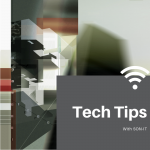Tech Tips: Staying Cyber-Safe While Traveling
 Many of us spend lots of time managing email. Want to make this time more efficient? Use keyboard shortcuts – there are many, and here’s a list of the most useful:
Many of us spend lots of time managing email. Want to make this time more efficient? Use keyboard shortcuts – there are many, and here’s a list of the most useful:
Alt+S Send an email
Ctrl+Enter Send the message you’re currently typing
CTRL+R Reply to an email
CTRL+F Forward an email
CTRL+K Complete the name you are typing into the address bar
CTRL+N Create a new email folder
CTRL+Shift+A Create a new calendar appointment
CTRL+Shift+O Open your Outbox
CTRL+Shift+I Open your Inbox
Ctrl+Shift+C Create a new contact
Try them out to see if they work for you – if they make your life easier, print a copy and put it beside your keyboard for easy reference.
Top 10 tips for keeping your data safe while traveling …
Most of us will travel at some point during the summer. Cyber-criminals know this and will be finding creative ways to get your data. Don’t make it easy for them. Here are ten tips to protect your data and devices while you travel.
·Protect your devices
- Keep them with you at all times
- Don’t draw attention to expensive phones, tablets and laptops
- Use the hotel safe when you are away from your room.
·Turn off Bluetooth
- It’s an easy way for a hacker to get into your device. If you don’t need it, turn it off.
·Update your passwords
- Consider changing your password before you leave and when you return home.
- Make sure you password is strong – remember, a longer password (> 11 characters) is safest.
·Use traveler apps sparingly
- Yeah, they can be fun tools, but downloading unknown apps can be a deceptive way for hackers to know your itinerary and get your data.
·Update your device
- Before leaving, check for and install updates on all devices.
·Backup
- Make sure your device backup is current.
- If you have a good backup, you’ll have an easier recovery if your phone is stolen or wiped.
·Leave your Duke data on the cloud
- What? You’re actually going to work while on vacation? Please don’t put Duke data on your mobile device. That includes laptops, tablets and phones.
- Use Box, OneDrive and your DUSON shared drives for all of your Duke data.
·Avoid public computers
- It can be convenient, but it’s definitely not secure.
- Do not perform financial transactions, including shopping, on public computers.
·Keep your devices locked
- Make sure your device is locked when you aren’t using it.
- Use the automatic locking features and choose a short period of inactivity.
- Use public Wi-Fi carefully
- Make sure you connect to correct, safe Wi-Fi in hotels or airports.
- RDUAirportFree and HiltonHotelsFree look real, but are more than likely “evil twin” Wi-Fi access points set up by criminals to monitor and acquire your data.
- Most hotel and airport Wi-Fi networks will require some sort of password or acknowledgement before you can use them.
- Never select the “connect automatically” option for public Wi-Fi networks.
- Cyber-criminals can set up an evil twin Wi-Fi called McDonaldsFree anywhere. If you selected the connect automatically option the first time you joined McDonaldsFree, they can access your device without your knowledge.
- Make sure you connect to correct, safe Wi-Fi in hotels or airports.
Extra Credit
So you’re already practicing all of our safe-computing tips while traveling? Here are two advanced tips to get you to the next level of cybersecurity.
·Use Multi-factor Authentication on all resources
- Most applications and websites now have the option of using two forms of authentication. We get that it’s a pain, but it’s one of the most effective ways to keep your data safe.
·Use a Personal VPN
- Using a personal VPN provides an encrypted connection between your device and your destination website. This is a critical component of travel cybersecurity, particularly when using hotel, airport or other public Wi-Fi networks. Select one that works on all of your devices. Need a suggestion? Here’s a nice comparison of different personal VPN services from a trusted source. If you’d like a recommendation for a basic, easy-to-use personal VPN, try TunnelBear. I use it as a personal VPN on my laptop, tablet and phone.
Going Deeper
Here’s a Traveler’s Tip Sheet from Homeland Security that you can print and keep handy as you’re packing for that next epic vacation.
Have any questions about this or other tech used at DUSON?
As always, if you have any technical questions or problems, please contact your IT Service Desk at 919-684-9200, or email to citdl@mc.duke.edu.